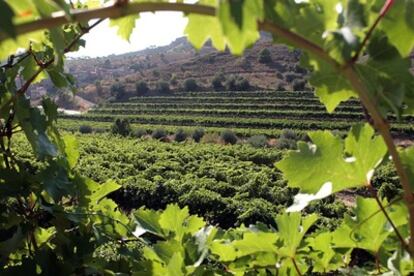The latest symptom of climate change: more alcoholic wines
The effect of weather on grapes is examined in Marbella
At the Third World Congress on Climate Change and Wine, held in Marbella last week, experts came to the conclusion that the grape variety known as "garnacha" in Spanish, or "grenache" in French, will be vital if Mediterranean wineries are to adapt to harsher climate conditions. Just a few months earlier, experts at a wine summit in Barbastro - the capital of the Aragonese wine-producing region of Somontano - had reached a similar conclusion, and issued several warnings. For one thing, they said, wines will have a higher alcohol content (in some cases this has already happened, going from 10 to 11 percent, and from 14 to 14.5 percent). But their natural acidity will also be lower, some reds will lose their color, others will lose their flavor, many whites will be deprived of their typical qualities, and there may be a greater proportion of reds to whites. Against this extreme scenario, analysts said that indigenous grapes would resist better than imports.
In other words, it looks like winemakers should start to bring back traditional varieties such as garnacha, moristel, parraleta and alcañón, which were yanked out of the ground in the 1980s to make way for the popular French varieties of chardonnay and cabernet sauvignon. So says Ernesto Franco Aladrén, chief of the enology department at the Aragón government's food agency.
Ignacio Fernández, then head of the economics and law department of the International Wine Organization, also warned that global warming meant harvests would take place earlier, and that extreme weather conditions such as high temperatures, extended droughts and torrential rains would increase. This in turn would create greater exposure to plant diseases and blights that were unknown to date.
"Spain will be one of the areas most affected by climate change," he said, adding that a one-degree temperature change pushes the boundaries of winemaking as much as 100 kilometers north - the fact that Britain now has 1,000 hectares of winemaking land would have been unthinkable just 150 years ago. Spain, by comparison, has 2.9 million acres of land planted with wine-producing vines.
Fernández also addressed the environmental impact of wineries themselves, defending lower water consumption, lower CO2 emissions and the maintaining of indigenous trees, such as olive trees and Aleppo pines, near which grapevines typically grow, in order to prevent single-species plantations.
Meanwhile, representatives of wineries at the summit shared some of their tricks for mitigating the effects of climate change, which everybody admitted were very real. A speaker for Miguel Torres S.A., a winemaker that has pioneered environmentally friendly techniques, said it had decided not to prune the higher leaves of the vines as much as it used to, in order to obtain more natural shade for the grapes.
The Barbastro event was organized by the Ecology and Development Foundation (Ecodes), a Zaragoza-based non-profit group, as part of the European Union's ENECO project, which seeks to get small and medium businesses involved in sustainable development. The participants at the Barbastro summit seemed to understand the urgency of the matter.
"If we don't do anything," said Fernández, "we will reach a point where production is no longer sustainable."

Tu suscripción se está usando en otro dispositivo
¿Quieres añadir otro usuario a tu suscripción?
Si continúas leyendo en este dispositivo, no se podrá leer en el otro.
FlechaTu suscripción se está usando en otro dispositivo y solo puedes acceder a EL PAÍS desde un dispositivo a la vez.
Si quieres compartir tu cuenta, cambia tu suscripción a la modalidad Premium, así podrás añadir otro usuario. Cada uno accederá con su propia cuenta de email, lo que os permitirá personalizar vuestra experiencia en EL PAÍS.
¿Tienes una suscripción de empresa? Accede aquí para contratar más cuentas.
En el caso de no saber quién está usando tu cuenta, te recomendamos cambiar tu contraseña aquí.
Si decides continuar compartiendo tu cuenta, este mensaje se mostrará en tu dispositivo y en el de la otra persona que está usando tu cuenta de forma indefinida, afectando a tu experiencia de lectura. Puedes consultar aquí los términos y condiciones de la suscripción digital.








































